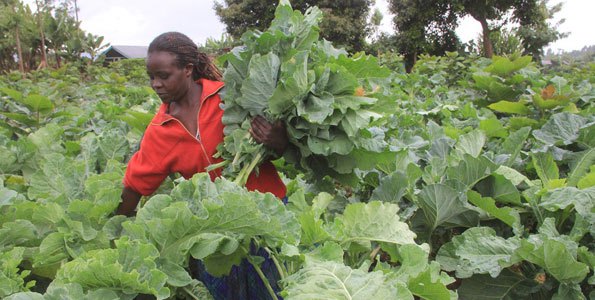A Nandi County farmer, Zabdi Chumba is earning approximately Sh120,000 in profits every three months after abandoning maize farming in 2015, a crop he had grown since he was in primary school.
The farmer supplies vegetables such as cabbages and kales to schools, groceries and consumers within Nandi County and its environs.
The amount he makes currently is 12 times more what he used to earn as a maize farmer considering that he was harvesting an average of 20 bags from his two acre farm with each 90kg bag retailing at an average of Sh3,000 on a good season.
Related
School uses sacks to grow vegetables instead of buying
Narok farmer earns Sh8,000 a week from traditional vegetables
As a maize farmer, Zabdi was investing Sh25,000 per acre to till land and purchase inputs such as fertilizer but he had to wait for seven months to harvest with one acre fetching only Sh5,000 in profits.
His shift to vegetable farming was inspired by a school learning exchange programme visit to Israel in 2015.
“What motivated me during the visit is how farmers in Israel utilize small pieces of land to produce a large bulk of agricultural products for local and international markets,” said Zabdi.
“Back in Kenya I realized that we have huge chunks of land which are either idle or under-utilized with majority of farmers using traditional methods of farming to grow crops,”

Only 20 per cent of the land in Israel in arable yet it is a major exporter of fresh produce and a world leader in agricultural technologies despite the fact its geography is not conducive to agriculture.
Zabdi and 24 other students from Egerton University faculty of agriculture stayed in Israel for one year learning of how to make use of limited resources in the food production process. In his free time, he worked as a part time agronomist at an agro firm.
In December 2016 he returned back to the country and used Sh200,000 savings accrued from maize sale over the years to install a drip irrigation system from Amiran Kenya on one acre of the farm acquired from his father, leaving the rest of the land for subsistence maize farming.
Drip irrigation is the practice of applying small amounts of water and fertilizer to plants uniformly across a specific area. In this, the components are distributed directly to the crop root zone thereby reducing the rate of evaporation and runoff. It saves on time and energy while at the same time maximizing yields.
“Since it was a dry season, I understood that if I planted vegetables I would get ready market by March 2017 as market demand wound be high,” said Zabdi.
He started off with the production of cabbages after purchasing seeds worth Sh6,000 from Amiran Kenya which he planted on 100 trays as opposed to the traditional nursery bed. The trays were loaded with pitmost sowing media which enhance faster germination of the seeds and allow for easy transplanting into the main garden.
Zabdi sprayed the seedlings with easy to grow folia feed at the rate of 100ml per 20 liters at least once a week to provide them with nutrients necessary for efficient growth. After three weeks, they were ready for transplanting.
He transplanted approximately 12,000 seedlings to the main bed with a spacing of 60 by 60cm.
“Once on the main bed cabbages require proper management practices such as weed control, control of pests and diseases and watering at least once in a day during the dry season,” said Zabdi.
“The main challenge I faced on the field is attack of the cabbages by pests such as spider mite, aphids and cutworms, which reduced my crop size by about 4,000 heads,”
“However, I controlled the pests with pesticides like jackpot and dudu dust which I applied alternatively,”
Zabdi harvested roughly 8,000 heads of Taurus cabbage variety in March 2017 which he sold to vendors and various schools within Nandi. Each cabbage head fetched him Sh40 bringing his total income to Sh320,000, a profit of Sh120,000 from the initial investment.
At the onset of the long rains in April 2017, Zabdi knew that majority of farmers in his region would grow cabbages so the market thus flooding the market in July, he thus chose to usen proceeds from the sale of the crop to invest in indigenous vegetables including spider plant (saga), black night shade and kales.
The farmer has been selling the indigenous vegetables since July 2017 earning him an average of Sh40,000 monthly. Apart from the vegetable sales, he has ventured into production of tomato, kales and indigenous vegetable seedlings through a modern nursery for sale to prospective farmers. He has since employed two casuals to help him in the day to day management of the farm.
He sells a tray of tomatoes with 160 seedlings for Sh300, while a tray of kales and cabbages goes for Sh250.
Zabdi can be reached on +254 725 828 794.
















Comments powered by CComment